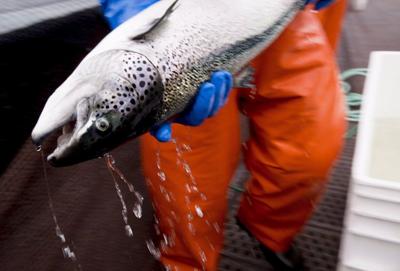HALIFAX - A Nova Scotia advocacy group opposed to open-net salmon farms is criticizing the provincial governmentŌĆÖs new coastal mapping tool, saying it does little more than promote an industry that deserves more scrutiny.
The Healthy Bays Network held a news conference Wednesday in a church hall in Dartmouth, N.S., where several experts took aim at the online Coastal Classification System (CCS), unveiled by the province in July.
The province’s Department of Fisheries and Aquaculture has said the interactive maps are designed to help aquaculture businesses with early stage planning. The maps are supposed to show the relative suitability of coastal areas for raising Atlantic salmon, rainbow trout, blue mussels or oysters.
The department has stressed that the maps will have no impact on aquaculture regulations and existing licensing requirements that include public input and consultation.
“The CCS doesnŌĆÖt make decisions about whether or where aquaculture will happen,” the department said Wednesday in a statement. “It simply brings together the best available environmental and regulatory data to inform early conversations and improve transparency.”
Still, lobster exporter Stewart Lamont argued that Premier Tim HoustonŌĆÖs Progressive Conservative government does not have the support of coastal communities to proceed with promoting open-net salmon farms.
ŌĆ£Our call to action is to listen to communities,ŌĆØ said Lamont, managing director of eastern Nova Scotia’s Tangier Lobster Company. He said the new maps are flawed because, among other things, they donŌĆÖt include data about wild salmon habitat.┬Ā
ŌĆ£The social licence, the community support, is missing and the government should be aware of that.”
Daniel Thimot, a third-generation fisherman with 30 years of experience on Nova Scotia’s St. Marys Bay, was more blunt. He said the feces expelled by salmon trapped in open-net pens can damage the environment.
“From what I’ve seen of these cages, when they first come in ... there’s lobsters crawling around them,” he said. “And after a while, with the feces (from the salmon), everything is dead around the cages. It kills the bottom and everything around it.”
Open-net salmon farms use large plastic rings that float on the surface of coastal waters, with nets extending down to anchors on the ocean floor.
This type of fish farming has long attracted protests from environmental groups and some First Nations who say they are linked to transferring disease to wild salmon and harming fishing grounds.
But supporters say the risks are unproven or overblown, and they cite potential economic fallout if such operations are phased out.
Catherine Collins, a former journalist and co-author of the book “Salmon Wars,” said Nova Scotia’s new mapping tool is no substitute for local, expert-driven analysis.
“Broad classifications should not be mistaken for precise evaluation,” she said.
Karen Traversy, a member of the Association for the Preservation of the Eastern Shore, said the mapping tool is supposed to improve public understanding of coastal conditions, but it will also be used to promote investment in the province’s $120-million aquaculture industry.
“The impression created is that we are open for business in many areas,” she said, pointing to a projected image of a large CCS map. Traversy went on to criticize the tool because she said it lacks data from the commercial lobster and scallop fisheries, which are key to the survival of many coastal communities.
“It’s just high-level indicators of the survivability of species, which is of great interest to the (aquaculture) industry,” she said.
To be sure, the provincial government is keen to develop the industry.
“There is tremendous economic growth potential in aquaculture in our rural coastal communities,” the Fisheries Department’s statement said. “We want to develop and grow this industry in a responsible and sustainable way to provide benefits to all Nova Scotians.”
This report by The Canadian Press was first published Sept. 11, 2025.

























To join the conversation set a first and last name in your user profile.
Sign in or register for free to join the Conversation